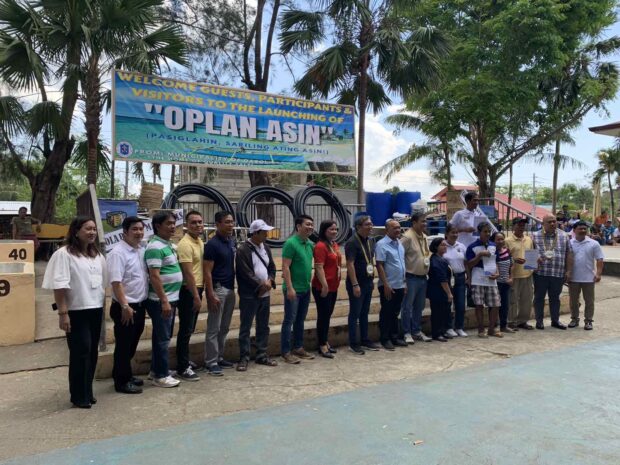
Government officials from different agencies launched Oplan Asin in Dasol, Pangasinan on Friday, March 10, 2023. INQUIRER.net photo / Jean Mangaluz
MANILA, Philippines — The Department of Agriculture’s Bureau of Fisheries and Aquatic Resources (DA-BFAR) on Friday launched the Development of Salt Industry Project (DSIP) or “Oplan Asin” to revitalize the country’s salt industry and production.
Salt farmers harvesting the mineral in Dasol, Pangasinan on Thursday, March 9, 2023. INQUIRER.net photo / Jean Mangaluz
Oplan Asin was inaugurated in Dasol, Pangasinan, a town filled with salt farmers. The local salt farmers have faced great difficulty in production, having to compete with imported salt, with 93 percent of the country’s salt coming from abroad.
READ: Pangasinan salt farmers rise above unstable incomes, importation
“With Oplan Asin, we will prioritize intervention to our existing salt producers and revive the inactive ones by helping them comply with the market requirements. This is in our bid to ensure sustainable salt production and livelihood of our salt farmers, and ultimately, attain national salt self-sufficiency,” DA-BFAR Director Demosthenes Escoto said in a statement.
Locally produced salt being sold on a roadside in Dasol, Pangasinan, on Thursday, March 9, 2023. INQUIRER.net photo / Jean Mangaluz
According to the DA-BFAR, Oplan Asin was implemented in 2022 in a joint effort with the National Fisheries Research and Development Institute to increase local production of high-quality salt.
Escoto stated that the project would prioritize the participation of the local salt producers and revive the idle industry while ensuring sustainability and the livelihood of the salt farmers.
Before the launch, a consultative dialogue with Dasol salt farmers was led by the offices of Senator Cynthia Villar and Senator Nancy Binay, Dasol local government, and the DA-BFAR to address industry needs such as market linkages, more on-farm and post-harvest equipment, social security of salt farmers, which was one of the pre-launching activities.
During the consultation, one of the reasons the farmers cited for the weakening of the salt industry was the Republic Act 8172 or the Asin Law that was passed in 1995, which mandated that local salt must be iodized, a process that was difficult for local farmers to comply with due to lack of support services and stiff market competition.
Villar, who appeared during the event launch through a recorded message, said that she is writing a law to help revive the industry by making iodization optional to the manufacturers.”
Among the participating regions of Oplan Asin, the Bureau has already provided fishery on-farm equipment and post-harvest facilities, upgraded storage units and warehouse facilities, training and capacity building workshops, and technology demonstrations.
The agency said that these initiatives will be expanded this year with the allotment of another PHP 100 million to seven regional offices that now include BFAR Regional Field Offices 3, 4A, 4B, and 7. —With reports from Mae Anne Bilolo, INQUIRER.net intern
RELATED STORIES:
Gov’t working ‘double time’ to boost salt industry
Salt industry revival plan to start with ‘profiling’ – DA